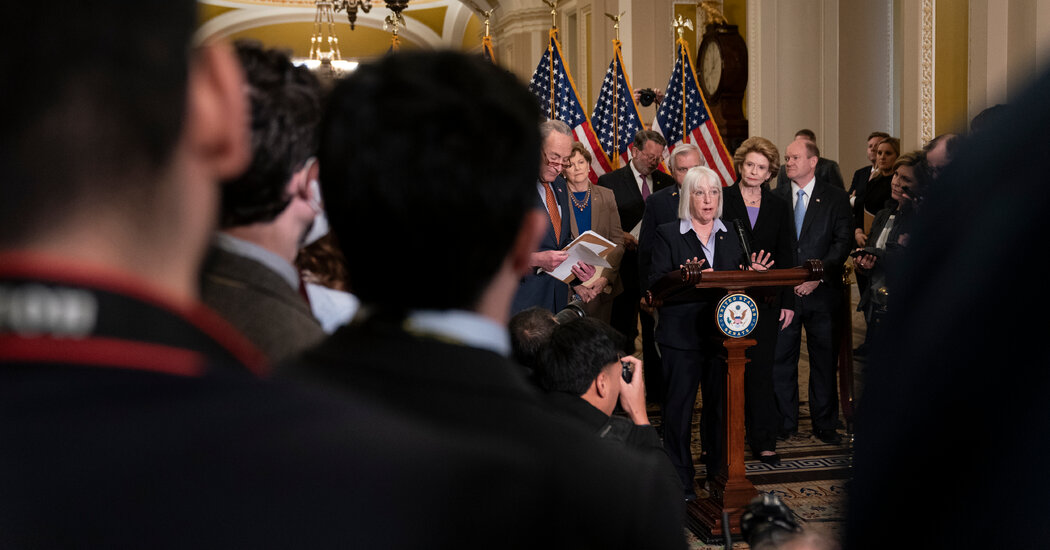Senate Democrats on Wednesday were set to force consideration of measures intended to protect women’s health and reproductive freedom, using the upcom
Senate Democrats on Wednesday were set to force consideration of measures intended to protect women’s health and reproductive freedom, using the upcoming anniversary of the Supreme Court’s decision to overturn Roe v. Wade to remind voters of the Republican opposition to measures with broad voter approval.
Senator Chuck Schumer of New York, the Democratic majority leader, planned to bring to the floor four bills that would protect a woman’s right to abortion access and contraception. He is doing so under a procedure that requires unanimous consent of the Senate, meaning that an objection from a single Republican lawmaker would result in their failure.
That was the point: to put Republicans into a position where they block what Democrats described as common-sense bills that protect existing rights, and to highlight how opposition to abortion rights and related issues has become a political liability at the national level for the G.O.P.
“As we fight to get the votes we need to restore Roe, it’s imperative that we make plain to the country just how extreme and dangerous Republicans’ anti-abortion agenda is,” Senator Patty Murray, Democrat of Washington, said in a statement.
Some Republicans dismissed the maneuver as nothing more than a blatantly partisan “Dobbs messaging festival,” coming during a busy week of committee work before Congress leaves for a two-week recess. (The case that overturned the right to abortion is Dobbs v. Jackson Women’s Health Organization.)
But Mr. Schumer said that Democrats would use it to “expose the Republicans’ radical, anti-choice agenda for what it is: an endless pursuit of a nationwide abortion ban.”
“Republicans, deep down, want to ban abortions for everyone, everywhere,” he said.
The proposed legislation the Senate expected to take up Wednesday afternoon includes a bill that would enshrine into law the right to use birth control; a bill that would ensure women can travel freely to receive abortion care, even if they live in states where legislatures have banned the right to travel out of state to receive such care; a bill to ensure doctors can continue to safely provide legal abortion care and protect health care providers from being held liable for providing services to patients from other states; and a bill to protect people’s online health data so it cannot be used against them.
The outcome seems preordained: Republicans blocked many of those same bills last year. Last year, the Senate also failed to pass legislation to guarantee abortion rights nationwide, as Republicans and one Democrat in the Senate blocked an effort to enshrine the Roe v. Wade precedent in federal law.
Since the overturning of Roe, 14 states have passed near-complete bans on abortion. An additional eight states have passed abortion bans that are temporarily blocked in court.
But the backlash has also helped boost Democrats in national elections. A record number of Americans say they support at least some access to abortion, according to recent polls. Reaction to the Dobbs decision helped mitigate an expected “red wave” in last year’s midterm elections.
Still, House Republicans have continued appealing to their conservative base, which has made opposition to abortion rights a litmus test, by trying to make access to abortion even harder. In the second policy bill they brought to the floor after taking back control of the House in January, Republicans pushed through legislation that could subject doctors who perform abortions to criminal penalties.
Representative Elise Stefanik, Republican of New York, in a speech this week said that protecting life was not an extreme position. Speaking in front of an anti-abortion group, Susan B. Anthony Pro-Life America, Ms. Stefanik tried to frame Democrats and progressives as extremists.
“Pro-life advocates were beaten by radicals in the streets, illegally targeted by President Biden’s F.B.I., and arrested in their homes with their children present for peacefully protesting and standing for life,” she said.
Still, it is not clear that message is resonating with voters. Representative Sharice Davids, Democrat of Kansas, won re-election last year in a district that was at the center of the fallout from the Dobbs decision, a red state where residents voted overwhelmingly to reject an initiative that would have ended abortion rights in the state.
“It was very impactful when it came to my re-election efforts,” Ms. Davids said in an interview this week, referring to the Supreme Court’s decision a year ago. “It’s an interesting tactic for folks with more extreme positions on this stuff to continue to push — even when voters have shown up at the ballot box to say this is not the thing we want you, Congress, to be legislating.”
On Tuesday, the Senate confirmed Julie Rikelman, an abortion-rights lawyer, as a federal appeals court judge. Ms. Rikelman represented the Mississippi abortion clinic in the Dobbs v. Jackson Women’s Health Organization, the case that lead to the overturning of Roe v. Wade.
www.nytimes.com
